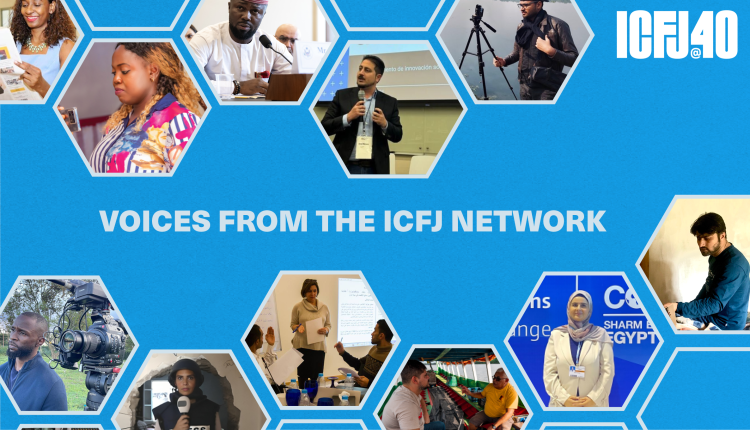A year has passed since we first asked our network to share their testimonies with us. We did it to mark our 40th anniversary, and were blown away by the responses. Hundreds of journalists across every region of the world wrote to tell us what being part of ICFJ’s network has meant to them.
Hearing from our network members reinvigorated me. Even more, it was inspiring to see what former fellows and program participants are doing now – a testament to the longtail impact and importance of supporting the courageous, trailblazing and dedicated individuals who make up our network.

People like…
- Anderson Meneses, who co-founded Agência Mural, a media outlet chronicling thousands of stories from and for underserved communities in Brazil.
“In a region where media professionals are often threatened and intimidated, ICFJ provides a safety net in the field, ensuring that we can continue our work effectively and safely.”
- Hannah Ajakaiye, whose investigation into contaminated water in Nigeria led to the revocation of licenses for treatment plants.
“The connection with ICFJ enabled me to do one of the stories that I regard as one of the biggest stories of my career.”
- Sarmad alJilane, whose reporting in Syria has documented human rights violations.
“Participating in the Mentoring Center was one of the most beneficial experiences of my professional life.”
- Tim Mak, whose Ukraine-based newsroom is chronicling the human side of war.
“[My fellowship with ICFJ] helped me build confidence and experience in foreign correspondence – something that I would not have had the opportunity to do otherwise.”
It is truly a privilege to work with these and other journalists. Backing them is vital, especially now. They provide crucial accountability reporting amid democratic backsliding globally, while navigating growing challenges – including financial struggles.
As we have for the last 40 years, ICFJ stands with the journalists in our network, and we remain committed to equipping them to deliver trustworthy news essential to free and strong societies.
Thank you to our network members for all that you do and continue to do despite the obstacles. You are an inspiration. Thank you also to our supporters, who share our commitment to fostering a vibrant, independent press. I hope you will take a moment to read some of the 40th anniversary ICFJ Voices stories to see how your contributions have made a difference.